formerly eScholarship Editions


|
|
|
|
Your search for
'Public Policy' in subject
found 65 book(s). | Modify Search | Displaying 1 - 20 of 65 book(s) | |
| 1. | 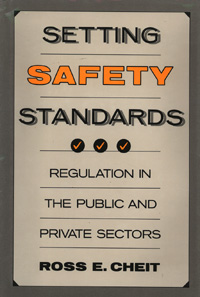 | Title: Setting safety standards: regulation in the public and private sectors Author: Cheit, Ross E Published: University of California Press, 1990 Subjects: Politics | Public Policy Publisher's Description: In this highly original and meticulously researched comparison of public and private standards-setting, Ross Cheit questions the old maxim that government-set safety standards are too severe while those set by the private sector are too lenient. Identifying the comparative institutional advantages of each arrangement through four paired case studies of grain elevators, woodstoves, aviation fire safety, and gas space heaters, he finds instead that some private standards are surprisingly strict, while government is better positioned to survey real-world experience and sponsor research likely to improve standards-setting. Setting Safety Standards challenges those political scientists who argue that only public institutions can advance the public interest in the controversial field of health and safety. Cheit draws attention to such little-known organizations as Underwriters Laboratories and the National Fire Protection Association, private-sector alternatives to the government regulation so frequently criticized as time-consuming, inflexible, and unreasonable. These organizations, he shows, play a far more significant role in regulation than most federal agencies, even though the standards they develop are widely - and often mistakenly - assumed to be less concerned with due process than government standards and often unduly lax.This study should be widely read by public policy and regulation experts in both the public and the private sectors as well as by academics in the field. [brief] Similar Items |
| 2. |  | Title: LifePlace: bioregional thought and practice Author: Thayer, Robert L Published: University of California Press, 2003 Subjects: EcologyEvolutionEnvironment | Conservation | Public Policy | California and the West | Public Policy Publisher's Description: Robert Thayer brings the concepts and promises of the growing bioregional movement to a wide audience in a book that passionately urges us to discover "where we are" as an antidote to our rootless, stressful modern lives. LifePlace is a provocative meditation on bioregionalism and what it means to live, work, eat, and play in relation to naturally, rather than politically, defined areas. In it, Thayer gives a richly textured portrait of his own home, the Putah-Cache watershed in California's Sacramento Valley, demonstrating how bioregionalism can be practiced in everyday life. Written in a lively anecdotal style and expressing a profound love of place, this book is a guide to the personal rewards and the social benefits of reinhabiting the natural world on a local scale. In LifePlace, Thayer shares what he has learned over the course of thirty years about the Sacramento Valley's geography, minerals, flora, and fauna; its relation to fire, agriculture, and water; and its indigenous peoples, farmers, and artists. He shows how the spirit of bioregionalism springs from learning the history of a place, from participating in its local economy, from living in housing designed in the context of the region. He asks: How can we instill a love of place and knowledge of the local into our education system? How can the economy become more responsive to the ecology of region? This valuable book is also a window onto current writing on bioregionalism, introducing the ideas of its most notable proponents in accessible and highly engaging prose. At the same time that it gives an entirely new appreciation of California's Central Valley, LifePlace shows how we can move toward a new way of being, thinking, and acting in the world that can lead to a sustainable, harmonious, and more satisfying future. [brief] Similar Items |
| 3. | 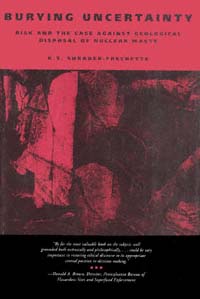 | Title: Burying uncertainty: risk and the case against geological disposal of nuclear waste Author: Shrader-Frechette, K. S. (Kristin Sharon) Published: University of California Press, 1993 Subjects: Science | Ecology | Public Policy Publisher's Description: Shrader-Frechette looks at current U.S. government policy regarding the nation's high-level radioactive waste both scientifically and ethically.What should be done with our nation's high-level radioactive waste, which will remain hazardous for thousands of years? This is one of the most pressing problems faced by the nuclear power industry, and current U.S. government policy is to bury "radwastes" in specially designed deep repositories.K. S. Shrader-Frechette argues that this policy is profoundly misguided on both scientific and ethical grounds. Scientifically - because we cannot trust the precision of 10,000-year predictions that promise containment of the waste. Ethically - because geological disposal ignores the rights of present and future generations to equal treatment, due process, and free informed consent.Shrader-Frechette focuses her argument on the world's first proposed high-level radioactive waste facility at Yucca Mountain, Nevada. Analyzing a mass of technical literature, she demonstrates the weaknesses in the professional risk-assessors' arguments that claim the site is sufficiently safe for such a plan. We should postpone the question of geological disposal for at least a century and use monitored, retrievable, above-ground storage of the waste until then. Her message regarding radwaste is clear: what you can't see can hurt you. [brief] Similar Items |
| 4. | 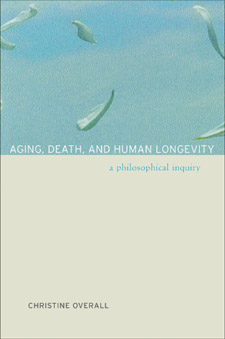 | Title: Aging, death, and human longevity: a philosophical inquiry Author: Overall, Christine 1949- Published: University of California Press, 2003 Subjects: Philosophy | Ethics | Public Policy Publisher's Description: With the help of medicine and technology we are living longer than ever before. As human life spans have increased, the moral and political issues surrounding longevity have become more complex. Should we desire to live as long as possible? What are the social ramifications of longer lives? How does a longer life span change the way we think about the value of our lives and about death and dying? Christine Overall offers a clear and intelligent discussion of the philosophical and cultural issues surrounding this difficult and often emotionally charged issue. Her book is unique in its comprehensive presentation and evaluation of the arguments - both ancient and contemporary - for and against prolonging life. It also proposes a progressive social policy for responding to dramatic increases in life expectancy. Writing from a feminist perspective, Overall highlights the ways that our biases about race, class, and gender have affected our views of elderly people and longevity, and her policy recommendations represent an effort to overcome these biases. She also covers the arguments surrounding the question of the "duty to die" and includes a provocative discussion of immortality. After judiciously weighing the benefits and the risks of prolonging human life, Overall persuasively concludes that the length of life does matter and that its duration can make a difference to the quality and value of our lives. Her book will be an essential guide as we consider our social responsibilities, the meaning of human life, and the prospects of living longer. [brief] Similar Items |
| 5. |  | Title: Reclaiming America: Nike, clean air, and the new national activism Author: Shaw, Randy 1956- Published: University of California Press, 1999 Subjects: American Studies | Politics | Public Policy Publisher's Description: Have activists taken the bumper-sticker adage "Think Globally, Act Locally" too literally? Randy Shaw argues that they have, with destructive consequences for America. Since the 1970s, activist participation in national struggles has steadily given way to a nearly exclusive focus on local issues. America's political and corporate elite has succeeded in controlling the national agenda, while their adversaries - the citizen activists and organizations who spent decades building federal programs to reflect the country's progressive ideals - increasingly bypass national fights. The result has been not only the dismantling of hard-won federal programs but also the sabotaging of local agendas and community instituions by decisions made in the national arena.Shaw urges activists and their organizations to implement a "new national activism" by channeling energy from closely knit local groups into broader causes. Such activism enables locally oriented activists to shape America's future and work on national fights without traveling to Washington, D.C., but instead working in their own backyards. Focusing on the David and Goliath struggle between Nike and grassroots activists critical of the company's overseas labor practices, Shaw shows how national activism can rewrite the supposedly ironclad rules of the global economy by ensuring fair wages and decent living standards for workers at home and abroad. Similarly, the recent struggles for stronger clean air standards and new federal budget priorities demonstrate the potential grassroots national activism to overcome the corporate and moneyed interests that increasingly dictate America's future. Reclaiming America's final section describes how community-based nonprofit organizations, the media, and the Internet are critical resources for building national activism. Shaw declares that community-based groups can and must combine their service work with national grassroots advocacy. He also describes how activists can use public relations to win attention in today's sprawling media environment, and he details the movement-building potential of e-mail. All these resources are essential for activists and their organizations to reclaim America's progressive ideals. [brief] Similar Items |
| 6. | 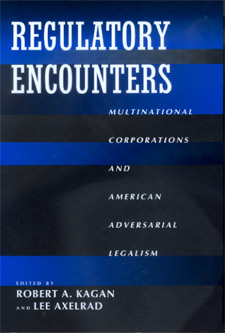 | Title: Regulatory encounters: multinational corporations and American adversarial legalism Author: Axelrad, Lee 1963- Published: University of California Press, 2000 Subjects: Politics | Public Policy | Law Publisher's Description: Regulatory Encounters reports on a path-breaking study of how government regulation of business in the United States differs in practice from regulation in other economically advanced democracies. In each of ten in-depth case studies, the contributors to this volume compare a particular multinational corporation's experience with parallel regulatory regimes in the United States and in Japan, Canada, Great Britain, Germany, The Netherlands, and the European Union, noting precisely which regulatory precautions were actually implemented in each country. The regulatory systems analyzed include aspects of environmental protection, product safety, debt collection, employees' rights, and patent protection. The studies in Regulatory Encounters indicate that the adversarial and legalistic character of American regulation imposes higher costs and delays on economic activity than comparable regulatory regimes in other economically advanced democracies, and often does not generate higher levels of protection for the public. [brief] Similar Items |
| 7. | 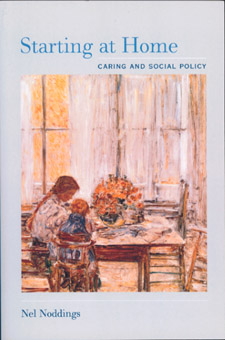 | Title: Starting at home: caring and social policy Author: Noddings, Nel Published: University of California Press, 2002 Subjects: Politics | American Studies | Anthropology | Social and Political Thought | Political Theory | Public Policy | Social Problems | Public Policy | Sociology | Sociology Publisher's Description: Nel Noddings, one of the central figures in the contemporary discussion of ethics and moral education, argues that caring--a way of life learned at home--can be extended into a theory that guides social policy. Tackling issues such as capital punishment, drug treatment, homelessness, mental illness, and abortion, Noddings inverts traditional philosophical priorities to show how an ethic of care can have profound and compelling implications for social and political thought. Instead of beginning with an ideal state and then describing a role for home and family, this book starts with an ideal home and asks how what is learned there may be extended to the larger social domain. Noddings examines the tension between freedom and equality that characterized liberal thought in the twentieth century and finds that--for all its strengths--liberalism is still inadequate as social policy. She suggests instead that an attitude of attentive love in the home induces a corresponding responsiveness that can serve as a foundation for social policy. With her characteristic sensitivity to the individual and to the vulnerable in society, the author concludes that any corrective practice that does more harm than the behavior it is aimed at correcting should be abandoned. This suggests an end to the disastrous war on drugs. In addition, Noddings states that the caring professions that deal with the homeless should be guided by flexible policies that allow practitioners to respond adequately to the needs of very different clients. She recommends that the school curriculum should include serious preparation for home life as well as for professional and civic life. Emphasizing the importance of improving life in everyday homes and the possible role social policy might play in this improvement, Starting at Home highlights the inextricable link between the development of care in individual lives and any discussion of moral life and social policy. [brief] Similar Items |
| 8. | 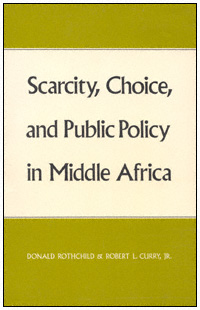 | Title: Scarcity, choice, and public policy in middle Africa Author: Rothchild, Donald S Published: University of California Press, 1978 Subjects: African Studies | Politics | Public Policy Similar Items |
| 9. | 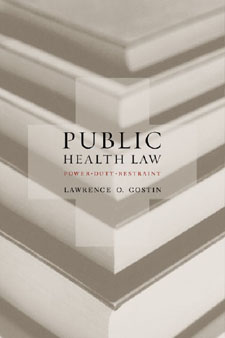 | Title: Public health law: power, duty, restraint Author: Gostin, Larry O. (Larry Ogalthorpe) Published: University of California Press, 2001 Subjects: Law | Medicine | Public Policy Publisher's Description: Gostin's timely book offers the first systematic definition and theory of public health law. Basing his definition on a broad notion of the government's inherent responsibility to advance the population's health and well-being, he develops a rich understanding of the government's fundamental powers and duties. By analyzing constitutional powers and limits, as well as statutory, administrative, and tort law, Public Health Law vividly shows how law can become a potent tool for the realization of a healthier and safer population. [brief] Similar Items |
| 10. | 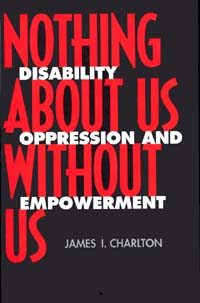 | Title: Nothing about us without us: disability oppression and empowerment Author: Charlton, James I Published: University of California Press, 1998 Subjects: Sociology | Public Policy | Urban Studies Publisher's Description: James Charlton has produced a ringing indictment of disability oppression, which, he says, is rooted in degradation, dependency, and powerlessness and is experienced in some form by five hundred million persons throughout the world who have physical, sensory, cognitive, or developmental disabilities. Nothing About Us Without Us is the first book in the literature on disability to provide a theoretical overview of disability oppression that shows its similarities to, and differences from, racism, sexism, and colonialism. Charlton's analysis is illuminated by interviews he conducted over a ten-year period with disability rights activists throughout the Third World, Europe, and the United States. Charlton finds an antidote for dependency and powerlessness in the resistance to disability oppression that is emerging worldwide. His interviews contain striking stories of self-reliance and empowerment evoking the new consciousness of disability rights activists. As a latecomer among the world's liberation movements, the disability rights movement will gain visibility and momentum from Charlton's elucidation of its history and its political philosophy of self-determination, which is captured in the title of his book. Nothing About Us Without Us expresses the conviction of people with disabilities that they know what is best for them. Charlton's combination of personal involvement and theoretical awareness assures greater understanding of the disability rights movement. [brief] Similar Items |
| 11. | 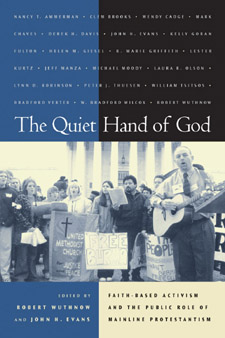 | Title: The quiet hand of God: faith-based activism and the public role of mainline Protestantism Author: Wuthnow, Robert Published: University of California Press, 2002 Subjects: Religion | Christianity | Sociology | Public Policy Publisher's Description: Robert Wuthnow and John H. Evans bring together a stellar collection of essays that paints a contemporary portrait of American Protestantism - a denomination that has remained quietly, but firmly, influential in the public sphere. Mainline Protestants may have steered clear of the controversial, attention-grabbing tactics of the Religious Right, but they remain culturally influential and continue to impact American society through political action and the provision of social services. The contributors to this volume address religion's larger role in society and cover such topics as welfare, ecology, family, civil rights, and homosexuality. Pioneering, timely, and meticulously researched, The Quiet Hand of God will be an essential reference to the dynamics of American religion well into the twenty-first century. [brief] Similar Items |
| 12. | 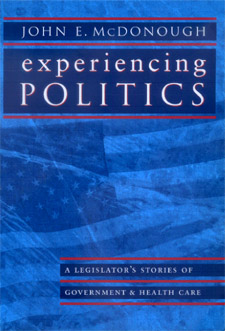 | Title: Experiencing politics: a legislator's stories of government and health care Author: McDonough, John E. (John Edward) Published: University of California Press, 2000 Subjects: Politics | Public Policy | Medicine Publisher's Description: John E. McDonough affords a rare glimpse into the practice of state politics in this insider's account of the fascinating interface between political science and real-life politics. A member of the Massachusetts House of Representatives for thirteen years and a skilled storyteller, McDonough eloquently weaves together stories of politics and policy with engaging theoretical models in a way that illuminates both the theory and the practice. By providing a link between scholarship and the world of experience, he communicates much about the essence of representative democracy. In the process, he demonstrates how politics extend beyond the public sphere into many aspects of life involving diverse values and interests. McDonough describes the nature of conflict, the role of interests, agenda setting, the nature and pace of change, the use of language, and more. Accessible, insightful, and original, his stories touch on a broad range of issues - including health care politics, campaigns, and elections; a street gang called the X-men; the death penalty; campaign finance reform, and tenants versus landlords. To the author, politics is everywhere and political dynamics are universal. While the setting for this book is one legislature, the lessons and insights are intended for everyone. [brief] Similar Items |
| 13. |  | Title: What price better health?: hazards of the research imperative Author: Callahan, Daniel 1930- Published: University of California Press, 2003 Subjects: Medicine | Philosophy | Public Policy Publisher's Description: The idea that we have an unlimited moral imperative to pursue medical research is deeply rooted in American society and medicine. In this provocative work, Daniel Callahan exposes the ways in which such a seemingly high and humane ideal can be corrupted and distorted into a harmful practice. Medical research, with its power to attract money and political support, and its promise of cures for a wide range of medical burdens, has good and bad sides - which are often indistinguishable. In What Price Better Health?, Callahan teases out the distinctions and differences, revealing the difficulties that result when the research imperative is suffused with excessive zeal, adulterated by the profit motive, or used to justify cutting moral corners. Exploring the National Institutes of Health's annual budget, the inflated estimates of health care cost savings that result from research, the high prices charged by drug companies, the use and misuse of human subjects for medical testing, and the controversies surrounding human cloning and stem cell research, Callahan clarifies the fine line between doing good and doing harm in the name of medical progress. His work shows that medical research must be understood in light of other social and economic needs and how even the research imperative, dedicated to the highest human good, has its limits. [brief] Similar Items |
| 14. |  | Title: Making environmental policy Author: Fiorino, Daniel J Published: University of California Press, 1995 Subjects: Environmental Studies | Public Policy | Ecology Publisher's Description: Who speaks for the trees, the water, the soil, and the air in American government today? Which agencies confront environmental problems, and how do they set priorities? How are the opposing claims of interest groups evaluated? Why do certain issues capture the public's attention?In Making Environmental Policy , Daniel Fiorino combines the hands-on experience of an insider with the analytic rigor of a scholar to provide the fullest, most readable introduction to federal environmental policymaking yet published. A committed environmental advocate, he takes readers from theory to practice, demonstrating how laws and institutions address environmental needs and balance them against other political pressures.Drawing on the academic literature and his own familiarity with current trends and controversies, Fiorino offers a lucid view of the institutional and analytic aspects of environmental policymaking. A chapter on analytic methods describes policymakers' attempts to apply objective standards to complex environmental decisions. The book also examines how the law, the courts, political tensions, and international environmental agencies have shaped environmental issues. Fiorino grounds his discussion with references to numerous specific cases, including radon, global warming, lead, and hazardous wastes. Timely and necessary, this is an invaluable handbook for students, activists, and anyone wanting to unravel contemporary American environmental politics. [brief] Similar Items |
| 15. | 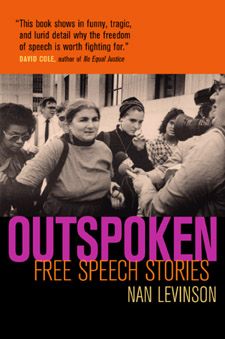 | Title: Outspoken: free speech stories Author: Levinson, Nan 1949- Published: University of California Press, 2003 Subjects: American Studies | Ethnic Studies | United States History | Media Studies | Public Policy | Sociology | Law | Public Policy | Urban Studies | Urban Studies Publisher's Description: With the government granting itself sweeping new surveillance powers, castigating its critics as unpatriotic, and equating differing opinions with abetting "America's enemies," free speech seems an early casualty of the war on terrorism. But as this book brilliantly demonstrates, to sacrifice our freedom of speech is to surrender the very heart and soul of America. Nan Levinson tells the stories of twenty people who refused to let anyone whittle away at their right to speak, think, create, or demur as they pleased. Among these sometimes unlikely defenders of the cause of free speech are a diplomat who disclosed secret information about government misconduct in Guatemala, a Puerto Rican journalist who risked going to prison to protect her sources, a high school teacher who discussed gays and lesbians in literature, a fireman who fought for his right to read Playboy at work, and a former porn star who defended her performance piece as art. Caught up in conflicts that are alarming, complex, confusing, mean, or just plain silly, their cases are both emblematic and individually revealing, affording readers a rich variety of perspectives on the issues surrounding free speech debates. In an engaging, anecdotal style, Levinson explores the balance between First Amendment and other rights, such as equality, privacy, and security; the relationship among behavior, speech, and images; the tangle of suppression, marketing, and politics; and the role of dissent in our society. These issues come to vibrant life in the stories recounted in Outspoken, stories that - whether heroic or infamous, outrageous or straightforward - remind us again and again of the power of words and of the strength of a democracy of voices. [brief] Similar Items |
| 16. | 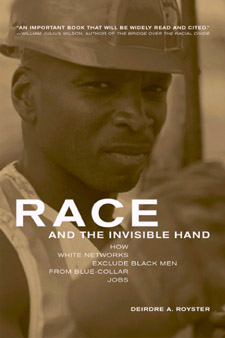 | Title: Race and the invisible hand: how white networks exclude black men from blue-collar jobs Author: Royster, Deirdre A. (Deirdre Alexia) 1966- Published: University of California Press, 2003 Subjects: Sociology | American Studies | Anthropology | Economics and Business | Urban Studies | Public Policy | African American Studies | Urban Studies | Public Policy Publisher's Description: From the time of Booker T. Washington to today, and William Julius Wilson, the advice dispensed to young black men has invariably been, "Get a trade." Deirdre Royster has put this folk wisdom to an empirical test - and, in Race and the Invisible Hand, exposes the subtleties and discrepancies of a workplace that favors the white job-seeker over the black. At the heart of this study is the question: Is there something about young black men that makes them less desirable as workers than their white peers? And if not, then why do black men trail white men in earnings and employment rates? Royster seeks an answer in the experiences of 25 black and 25 white men who graduated from the same vocational school and sought jobs in the same blue-collar labor market in the early 1990s. After seriously examining the educational performances, work ethics, and values of the black men for unique deficiencies, her study reveals the greatest difference between young black and white men - access to the kinds of contacts that really help in the job search and entry process. [brief] Similar Items |
| 17. | 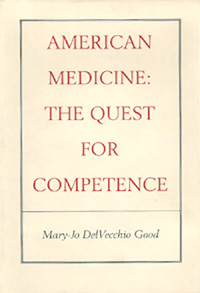 | Title: American medicine: the quest for competence Author: Good, Mary-Jo DelVecchio Published: University of California Press, 1995 Subjects: Medicine | Science | Medical Anthropology | Public Policy Publisher's Description: What does it mean to be a good doctor in America today? How do such challenges as new biotechnologies, the threat of malpractice suits, and proposed health-care reform affect physicians' ability to provide quality care?These and many other crucial questions are examined in this book, the first to fully explore the meaning and politics of competence in modern American medicine. Based on Mary-Jo DelVecchio Good's recent ethnographic studies of three distinct medical communities - physicians in rural California, academics and students involved in Harvard Medical School's innovative "New Pathway" curriculum, and oncologists working on breast cancer treatment - the book demonstrates the centrality of the issue of competence throughout the medical world. Competence, it shows, provides the framework for discussing the power struggles between rural general practitioners and specialists, organizational changes in medical education, and the clinical narratives of high-technology oncologists. In their own words, practitioners, students, and academics describe what competence means to them and reveal their frustration with medical-legal institutions, malpractice, and the limitations of peer review and medical training.Timely and provocative, this study is essential reading for medical professionals, academics, anthropologists, and sociologists, as well as health-care policymakers. [brief] Similar Items |
| 18. | 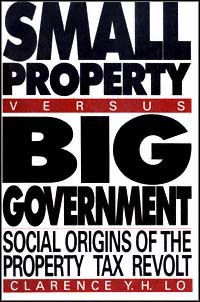 | Title: Small property versus big government: social origins of the property tax revolt Author: Lo, Clarence Y. H Published: University of California Press, 1990 Subjects: Sociology | American Studies | Public Policy | Law | Sociology Publisher's Description: Tax reformers, take note. Clarence Lo's investigation of California's Proposition 13 and other tax reduction bills is both a tribute and a warning to people who get "mad as hell" and try to do something about being pushed around by government. Homeowners in California, faced with impossible property tax bills in the 1970s, got mad and pushed back, starting an avalanche that swept tax limitation measures into state after state. What we learn is that, although the property tax was slashed, two-thirds of the benefits went to business owners rather than homeowners.How did a crusade launched by homeowning consumers seeking tax relief end up as a pro-business, supply-side political program? To trace the transformation, Lo uses the firsthand recollections of 120 activists in the movement, going back to the 1950s. He shows how their protests were ignored, until a suburban alliance of upper-middle-class property owners and business owners took charge. It was the program of that latter group, not the plight of the moderate-income homeowner, which inspired tax revolts across the nation and shaped the economic policies of the Reagan administration. [brief] Similar Items |
| 19. | 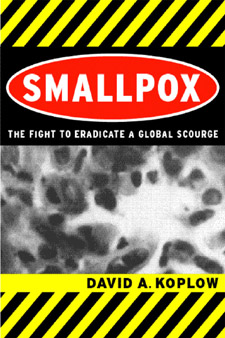 | Title: Smallpox: the fight to eradicate a global scourge Author: Koplow, David A 1951- Published: University of California Press, 2003 Subjects: Politics | American Studies | Public Policy | Disease Publisher's Description: Though smallpox was eradicated from the planet two decades ago, recent terrorist acts have raised the horrific possibility that rogue states, laboratories, or terrorist groups are in possession of secret stockpiles of the virus that causes the disease, and may be preparing to unleash it on target populations. Because it is a far deadlier killer than other biological warfare agents such as anthrax, and because the universal vaccination against smallpox was halted decades ago, a smallpox attack today would be nothing short of catastrophic. This clear, authoritative study looks at the long and fascinating history of the virus, with an informative overview of the political, biological, environmental, medical, and legal issues surrounding the question of whether or not the virus should be exterminated. The only two known samples of the virus are currently stored in Atlanta and Russia. The World Health Organization has repeatedly scheduled their destruction - an action that would rid the planet of all publicly acknowledged smallpox strains forever. Opponents of this plan argue that by destroying these last samples we are denying the possibility that this unique virus could be turned to beneficial purposes in basic scientific research. Others see the stockpile as part of a deterrent against future germ attacks. Proponents of prompt eradication argue that scientists have already learned all they can from this particular virus, and that by destroying the stockpile we are preventing it from ever falling into the wrong hands. As a thirty-year veteran of arms control issues, David Koplow is uniquely suited to provide readers with an informed and well-considered understanding of the complexities involved in the handling of this deadly virus. [brief] Similar Items |
| 20. | 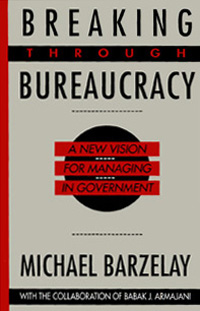 | Title: Breaking through bureaucracy: a new vision for managing in government Author: Barzelay, Michael Published: University of California Press, 1992 Subjects: Politics | Public Policy | Economics and Business Publisher's Description: This book attacks the conventional wisdom that bureaucrats are bunglers and the system can't be changed. Michael Barzelay and Babak Armajani trace the source of much poor performance in government to the persistent influence of what they call the bureaucratic paradigm - a theory built on such notions as central control, economy and efficiency, and rigid adherence to rules. Rarely questioned, the bureaucratic paradigm leads competent and faithful public servants - as well as politicians - unwittingly to impair government's ability to serve citizens by weakening, misplacing, and misdirecting accountability.How can this system be changed? Drawing on research sponsored by the Ford Foundation/Harvard University program on Innovations in State and Local Government, this book tells the story of how public officials in one state, Minnesota, cast off the conceptual blinders of the bureaucratic paradigm and experimented with ideas such as customer service, empowering front-line employees to resolve problems, and selectively introducing market forces within government. The author highlights the arguments government executives made for the changes they proposed, traces the way these changes were implemented, and summarizes the impressive results. This approach provides would-be bureaucracy busters with a powerful method for dramatically improving the way government manages the public's business.Generalizing from the Minnesota experience and from similar efforts nationwide, the book proposes a new paradigm that will reframe the perennial debate on public management. With its carefully analyzed ideas, real-life examples, and closely reasoned practical advice, Breaking Through Bureaucracy is indispensable to public managers and students of public policy and administration. [brief] Similar Items |